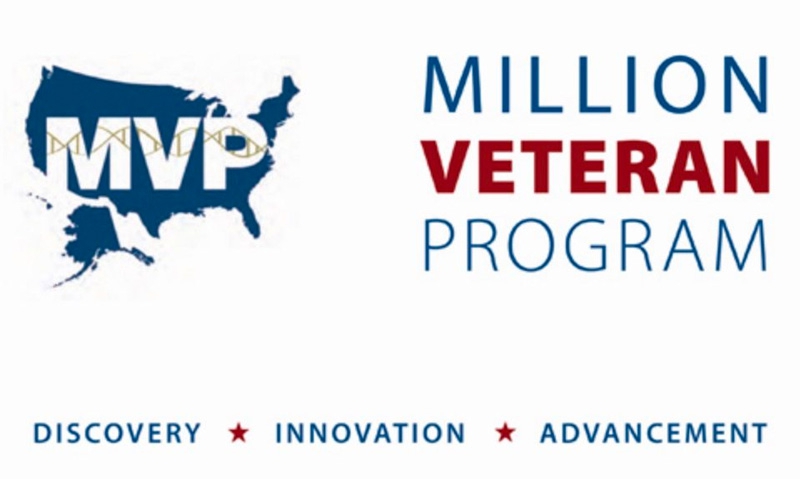
National Commander Denise H. Rohan hears update on Million Veteran Program, learns about a women's treatment and recovery program, and greets patients.
American Legion National Commander Denise H. Rohan received an update on the Million Veteran Program (MVP) during her visit to the West Roxbury Campus of the VA Boston Healthcare System on April 6 with Department of Massachusetts leadership, which included Past National Commanders Jake Comer and Paul Morin, Commander Michael Davis and Adjutant Milton Lashus, as well as American Legion Executive Director Verna Jones.
MVP is an initiative of the Department of Veterans Affairs to collect genetic information from one million veterans who are enrolled in the VA in order to build a database of genetic, military exposure, lifestyle and health information. The purpose of MVP is for VA researchers to better understand how genes affect health and illness so doctors can design future treatments to an individual’s molecular body composition. The program looks at post-traumatic stress disorder, cancers, mental health, diabetes, cardiovascular health and more.
To date, more than 650,000 genetic samples have been collected.
“Our veterans know how important this is … they view it as another way to serve their country,” said Dr. Mike Gaziano, principal investigator of MVP and the scientific director of the Massachusetts Veterans Epidemiology Research and Information Center at Boston VA. “I have to say that there is nothing more satisfying than working in this community. Our job is to find some new cures, figure out how genes work, and it’s really a way I think that we’re leading the world in this kind of research. (VA) will use this information to understand how diseases really work.”
A goal for the program is to have more diversity. “Diversity is key to what we are doing,” said Jennifer Deen, who works on recruitment, engagement and public relations for MVP. Only about 50,000 of the genetic samples collected are from female veterans. And with a study currently underway on predicting breast cancer risks in women veterans, the increase of female enrollees is a goal for the program. “We need to do better.
“And we need to do better with our minority veterans.” Through their studies, Deen said that they are seeing that macular degeneration presents differently in African-Americans than it does in Caucasian men.
MVP will once again be exhibiting at The American Legion’s national convention in Minneapolis this August. They will have a booth in the exhibit hall where they will be enrolling Legionnaires in the program and collecting a blood sample. MVP is taking part in celebrating the Legion’s centennial by having a goal of enrolling 100 veterans a day, for five days, in the program.
During their visit, Rohan and department leadership also learned about Boston VA’s Women’s Integrated Treatment and Recovery Program (WITRP), the only one of its kind. The program provides specialized treatment for women veterans who have both PTSD and substance abuse problems. It opened in 2017, and has served over 350 women veterans from 40 states – a group of eight women veterans every eight weeks live and attend treatment groups together.
Dr. Sharon Baker, a psychologist with WITRP, shared that the average age of the women is 45, they have been out of service about 15 years, 80 percent have experienced military sexual trauma, 84 percent have alcohol dependence and 63 percent have drug dependence.
Iraq Army veteran AJ Thomas went through the program and shared her experience. Once she left the military in 2004, she had difficulty finding her way and “didn’t feel like I fit in,” she said. “I didn’t know how to socialize. I didn’t know who I was. I started self-medicating (alcohol) then trying drugs.”
Through care at another VA, she learned about WITRP and became “excited.” It gave her a new way of thinking and a new life. “I could picture myself being sober … I learned to be mindful, to breathe. I learned to be able to express how I was feeling.”
Rohan’s visit at the Roxbury campus also consisted of visiting with patients at the bedside and in the lobby. Several of the patients she spoke with were Legionnaires, such as 46-year Legion member Bob Winston and Mary Corrigan.
Corrigan, an Army veteran, has been participating in the National Veterans Wheelchair Games ever since she lost both legs to health reasons 11 years ago. When she showed up to her first games in Milwaukee in 2007, to compete in swimming, firing and bowling, seeing 600 other veterans in wheelchairs “was the best medicine for me,” said Corrigan, a member of American Legion Post 440 in Newton, Mass. Corrigan was leaving the VA after swimming in the therapy pool when she was greeted in the lobby by Rohan.
- Commander

